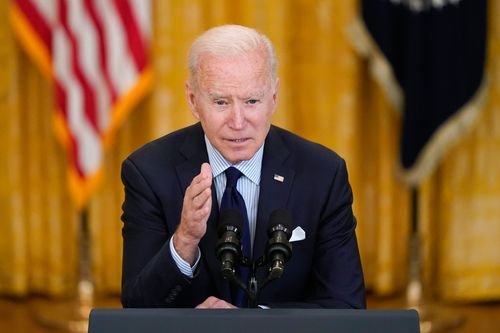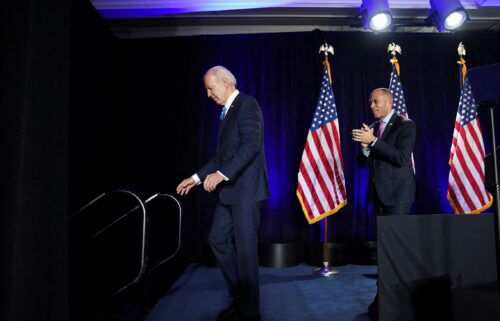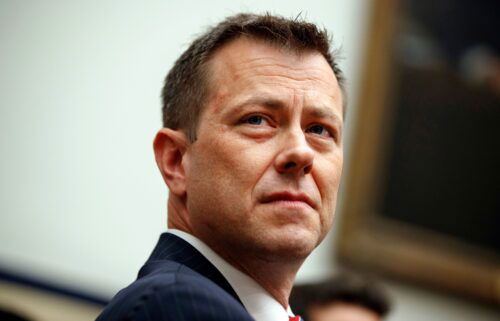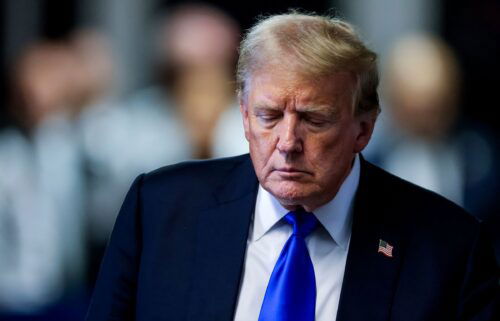Biden’s ‘core conviction’ drives his push to tax corporations and the rich. It could cost him.

President Joe Biden’s steadfast belief in taxing corporations and the rich has become a central plank in his legislative agenda, even as he’s warned of political peril and red lines from Republicans.
GOP senators, some of whom Biden hosted in the Oval Office on Thursday as he seeks a bipartisan infrastructure deal, have rejected them outright. Some Democrats, cognizant of the political backlash past increases have wrought, have quietly warned of their unease.
Top business lobbying groups are already laying the groundwork to attack the proposals and considering the kind of moneyed opposition that simply didn’t materialize in Biden’s successful $1.9 trillion Covid relief plan.
But to view those increases through a purely political or even technical policy lens is to miss what animates Biden’s attachment to them, close advisers say.
Biden’s calculated decision to spend the past two weeks highlighting those increases in nearly every public appearance, in some of the most impassioned and personal terms, reveals his deep-seated belief that they are more than just a way to pay for his $4 trillion legislative agenda. According to top advisers, the President’s tax proposal is an issue of fairness and Biden is not shy about explaining why it’s a necessity in this moment, even if the current political landscape would lead many politicians to reconsider such a plan.
“Conviction really drives him,” one of his closest advisers, Mike Donilon, told CNN in an interview. “It’s a core conviction that’s reflected in policy choices.”
That conviction will be put to the test as the President dives back into bipartisan talks over an infrastructure package he has proposed financing through corporate tax increases. The six Senate Republicans slated to visit the Oval Office Thursday have each made clear that tax increases are a non-starter.
“Clearly, Senate Republicans are not interested in revisiting the 2017 tax bill,” Senate Minority Leader Mitch McConnell said after a nearly two-hour Oval Office meeting with Biden that included his House counterparty, Rep. Kevin McCarthy of California. “We both made that clear to the President. That’s our red line.”
‘Not even a tiny little bit’
Biden has made clear he wants to see if there’s space for a deal. He’s even told advisers he sees benefits for the country for a bipartisan physical infrastructure agreement, even one much smaller than the $2.3 trillion he has proposed.
White House officials and key Democrats in Congress have been exploring different vehicles and pathways to pursue a bipartisan measure, officials say. Some Democrats have urged the White House to view infrastructure as long-term investment, one that doesn’t need to be financed on the front end.
It’s something White House officials say they haven’t taken off the table, though one senior administration official said it’s not something Biden personally has warmed to at this point.
For now, only two red lines have been set.
“The President’s red lines are inaction and are anything that would raise taxes on people making less than $400,000 a year,” White House press secretary Jen Psaki said this week.
But if the last several weeks are any indication, the idea that Biden would back off his proposed method for financing that proposal is exceedingly unlikely.
Biden has delved into what he sees as the overarching story of his tax proposals in nearly every public appearance since his prime-time address to a joint session of Congress in increasingly personal and off-the-cuff terms. He’s taken to ad-libbing lines in his prepared remarks to underscore that he’s not out to punish the rich but that he instead sees it as necessary to rebalance the current US economic system.
“We’re not going to deprive these executives their second or third home, travel privately by jet,” Biden told reporters last week. “It’s not going to affect their standard of living at all. Not a little tiny bit. But I can affect the standard of living that people I grew up with.”
He’s willing to compromise and pare back the increases for Democrats wary of their scale and Republicans dead set against them entirely. But he’s taken to turning questions about those potential policy compromises not as a way to lay out red lines for a negotiation, but instead as another opportunity to delve right back into the story of why he views them as so essential. That’s not by accident.
“He very much believes that you need to give people a window into why you’re doing it, a story you can follow to explain why you’re going down this road, and repetition,” Donilon said.
A moment of opportunity
In other words, Biden actually wants to talk about raising taxes.
Not just because it polls well — though White House officials will gladly offer up reams of data that show it does just that.
Not just because it’s a way to raise hundreds of billions of dollars to pay for his sweeping proposals — though White House officials make clear that’s exactly what it does, without raising taxes on anyone making less than $400,000.
But because, his advisers say, he genuinely believes this is a moment to fundamentally change the direction of the US economy.
“Trickle-down economics has never worked and it’s time to grow the economy from the bottom and the middle out,” Biden said in his prime-time address.
Biden and his top advisers spent much of the day leading up to the speech focused on refining the 15 paragraphs laying out his tax proposals, according to two senior administration officials. It was a lengthy passage in a high-stakes speech, one that Biden made clear to advisers he needed to get right, one that needed to tell the story in way that the American public would understand.
Biden knows the policy details “inside and out,” according to one adviser, but has more often taken to speaking in sweeping terms about shifting the economic paradigm in the country. One adviser joked that based on how animated the President gets when he talks privately about the need for fairness that drives his proposal, he may not even be aware the polling leans in his direction on the issue.
A separate adviser said Biden is indeed aware of the polling, but that it’s simply not the issue he gravitates toward when talking about why he’s so deeply engaged in his proposal.
He regularly speaks in private meetings of this being a moment that could be looked back on 50 years from now as the time the US changed the direction of a country beset by a near-term public health crisis and a long-term crisis driven by economic inequality, advisers say. He talks about how the world is watching — a rising China in particular.
“He thinks this is an incredible moment of opportunity,” was how one senior official framed Biden’s perspective.
A moment full of risk
But it’s also an issue fraught with political risk.
A handful of moderate Democrats on Capitol Hill, while broadly supportive of the $4 trillion in infrastructure and economic proposals the President has put on the table, have signaled to leadership — and, in some cases, the White House directly — that they are uncomfortable with the scale of the increases, according to multiple people familiar with the conversations.
Each day that passes is one closer to a midterm election that Democrats enter with the slimmest of majorities in Congress. Next year’s elections could test if the political backlash for tax increases — and the potent campaign trail issue they have been for Republicans — still carries weight, even as the public polling underscores significant support for raising taxes on corporations and the wealthy.
Republicans have attacked the proposals as designed to stifle economic growth, all in the name of significantly expanding the range of the social safety net. They view any effort to revise the 2017 tax law, something many Republicans cite as a cornerstone legislative achievement, as dead in the water.
A week of poor economic data, most notably a jobs report that significantly undershot economist expectations, only served to harden that opposition.
In interviews with nearly a dozen GOP members, most argued that they would be unwilling to raise the corporate tax rate even a single point to cover the cost of infrastructure.
Biden has proposed a seven-point increase, though he has opened the door to a smaller iteration.
“The problem I have with that is we just think it is one percent incremental revenue, but I think we are going to see a contraction of economic activity that will consume most of that,” said Sen. Thom Tillis, a North Carolina Republican. “I just don’t see it as a real pay-for.”
Biden has repeatedly said he doesn’t want to add to the deficit. But more salient, advisers say, is how he views how the money raised from his proposed tax hikes can be deployed — not just to long overdue investment in physical infrastructure, but also in his sweeping proposals on child-care, education and paid family leave. It’s the story Biden and his advisers believe resonates, with on adviser noting Biden’s “keen antenna” for identifying and honing in on the issues that matter to Americans.
But when it comes to taxes, it’s also one in a candid moment in front of reporters Biden acknowledged isn’t an easy sell.
“I’m going to have to be able to explain this and I’m going to keep banging at it,” Biden said.
But it’s a story in which the President makes clear he doesn’t view the tax increases in isolation, as a pure policy play. To Biden, they represent an integral part of a broader, more overarching goal.
“He has a strong sort of fundamental belief of what’s at stake, and that these choices we’re going to make, they’re going to change a lot of people’s lives in the long term — or at least have the potential to,” Donilon said. “He thinks it’s well worth the effort.”



